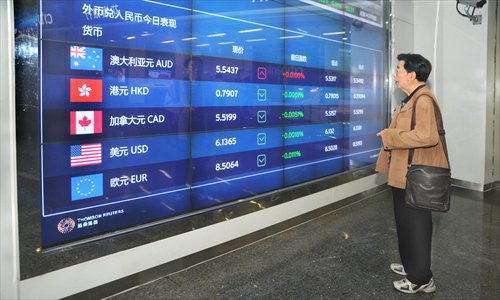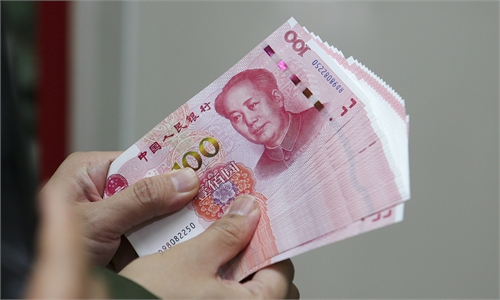China’s forex reserves fall sharply in April, but overall stability to persist: official

A man looks at the exchange rate information in Shanghai. Photo: IC
China's foreign exchange reserves fell sharply in April as the prices of global financial assets declined significantly amid a strengthening US dollar, but the solid fundamentals of the Chinese economy will continue to support overall stability in foreign exchange reserves, an official said.
The country's foreign exchange reserves fell to $3.12 trillion in April, down $68.3 billion or 2.14 percent from the end of March, data from the State Administration of Foreign Exchange (SAFE) showed on Saturday.
"The decline in forex reserves was mainly attributed to the combined impact of the surge in the US Dollar Index and the sharp decline in financial asset prices globally, as well as other factors including the ongoing pandemic, geopolitical volatility and monetary policy expectations in major economies," said Wang Chunying, deputy head and spokesperson for the SAFE.
In April, the US Dollar Index rose to 103.05, its highest since January 2017, up 4.7 percent.
The nation's forex reserves is denominated in US dollars, so the value of non-dollar currencies would decrease if they are converted into US dollars, which, along with changes in asset prices and other factors, led to the dwindling scale of China's forex reserves in April, Wang noted.
The Japanese yen declined 6.2 percent against the dollar last month, while the euro was down 4.7 percent and the British pound fell 4.35 percent.
A stronger US dollar has sent the prices of many financial assets down. In April alone, Japanese stocks fell 3.5 percent and European stocks fell 2.6 percent. In the US, the S&P 500 tumbled 8.8 percent.
Noting the rising external uncertainties and increasing fluctuations in the global financial market, Chinese officials and experts stressed that China's forex reserves - the largest in the world - can maintain stability in the next stage, and the country has the foundation and conditions to adapt to the current round of US Fed policy adjustments.
The US Fed raised its benchmark interest rate by half-a-percentage point earlier this month, following a quarter-point increase in March, as its campaign against inflation continued.
"China's overall coordination of epidemic prevention and control and economic and social development, combined with its strong economic resilience, sufficient potential and long-term positive fundamentals, are conducive to maintaining the overall stability of forex reserves," Wang noted.
China continued to see cross-border capital net inflows in April, and the supply and demand of the domestic foreign exchange market remained balanced, according to Wang.
Wen Bin, chief analyst at China Minsheng Bank, said that a range of recent policies were aimed at enhancing the stability of the foreign exchange market.
"Policy support needs to be further strengthened to expand domestic demand and stabilize foreign trade, as well as to support industries, enterprises and individuals in difficulty, ensure the stability of industry chains, and accelerate an economic recovery," Wen said.
It is also necessary to guard against risks to maintain the basic balance of supply and demand in the foreign exchange market, according to Wen.
Amid the yuan's accelerated depreciation against the dollar, China's central bank on April 25 announced cuts to the forex reserve requirement ratio for financial institutions by 1 percentage point to 8 percent to shore up the capacity of financial institutions to use foreign exchange funds.


